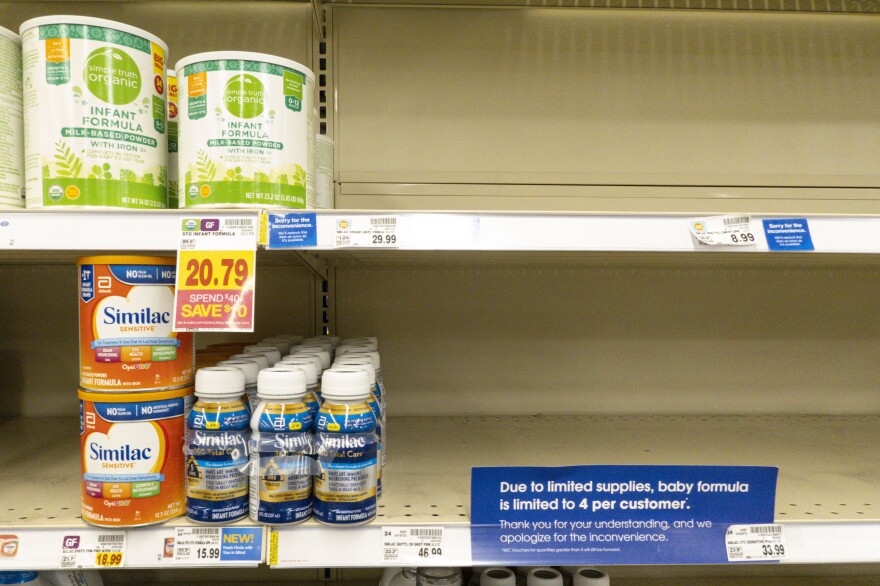A shortage in baby formula continues to plague Michigan parents. The short supply has some families looking to local food pantries for assistance, but many pantries say their hands are tied, due to the formula industry's high price points.
The shortage comes as supply chains continue to struggle with pandemic-related lags and about three months after health care company Abbott recalled some of its powdered formula.
Shay Kovacs, program manager at the food bank Feeding America West Michigan, told WGVU the shortage creates a two-fold problem for low-income parents: supply and cost. When certain formulas are taken off the shelves, families previously using them are forced to quickly find new brands that will be suitable for their child. This can create a stress for even more customers, as now there is a greater volume of families sifting through a smaller pool of product, and those with the ability to buy in bulk have the edge.
“It’s not like changing laundry detergent or hand soap when what you want isn’t available. This makes up a huge part of a baby’s diet. When they’re infants that’s all they consume," Kovacs explained.
Feeding America West Michigan is one of the largest distributors of second-chance food in the U.S., giving 18-30 million pounds per year. However, Kovacs says next to none of that is baby formula. High prices are making it almost impossible for the nonprofit to get its hands on.
“We can’t even get a good enough deal on them (formula) to provide them. So, the only times we’re able, as a food bank, to provide baby formula on a regular basis is if and when we get it donated which I can tell ya in my six years here has been very infrequently," she said.
This leaves many parents who depend on food banks struggling to make due. Grocery aisles are scarce, and available formula is financially out of reach. Stores like Costco have implemented a limit to the amount of formula a customer can buy at a time. Kovacs said while this may even the playing field for those who can't afford to buy in bulk, it can also create an access barrier for people who don't live near stores or have adequate means of transportation. She noted those individuals would have to make multiple, long-distance trips to the store per week to keep up with their child's feeding schedule.
“Clients tell us they water down the formula to make it go further. Well, the baby isn’t going to get the all the nutrients and all the things that they need because the formula is watered down. That's a problem, but families have no choice. This is what they feel they have to do to make ends meet, and that's awful. That's an awful place for our parents to be," she said, noting this instance isn't specific to the shortage alone.
The U.S. Department of Health and Human Services estimates families can spend up to $1,500 on formula in a baby’s first year. Speaking as a mother, Kovacs calls the industry predatory.
“It’s a much deeper issue than 'well there was a recall and now there’s a shortage.' It's a much deeper issue. I think we really should be talking about how something so simple as one formula plant shutting down really can throw vulnerable families off kilter," Kovacs said.
When asked if she knew of other pantries that stock formula, Kovacs said parents can try baby pantries, which specialize in infant goods. However, she notes the number of these pantries has been declining due to high prices. Government assistance programs like WIC also try to mitigate these costs for families who qualify, but for the families who don’t, Kovacs said it’s a scary place to be.
"It's very expensive to have children, and we can argue all day about whether or not the government does enough to support those families, but the reality is when you're in this particular situation, there's not a lot of support out there, and that's very scary," she said.
While Feeding America West Michigan may not be able to help the masses in their formula needs, Kovacs said she and her team will make it their mission to provide guidance to those who come through the door.
"I have been there. A lot of people who I work with here feel very strongly about these things because we've been there. We know what it's like to be hungry to be afraid and trying to figure out where you go for assistance, but the tools are there, and we want to help," Kovacs said. "At the bare minimum if you can't figure out any of the other things give us a call at the food bank, and we will get you hooked up with somebody that can help you."






